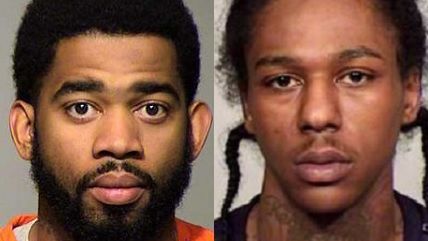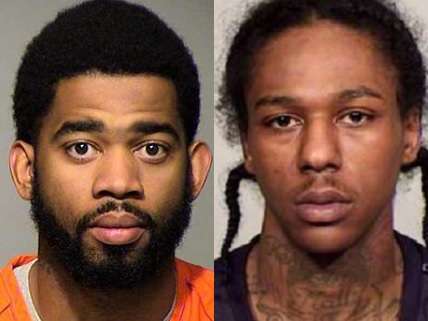Former Milwaukee Cop Charged in Fatal Shooting of Sylville Smith; Was Fired for Separate Sexual Assault Charges
Faces 60 years in prison on one count of first-degree reckless homicide.


Dominique Heaggan-Brown, the former Milwaukee police officer who shot and killed Sylville Smith after a foot pursuit in August, setting off several days of protests, some of which turned violent, has been charged with one count of first-degree reckless homicide, which carries a maximum penalty of 60 years in prison.
The district attorney's office filed charges after receiving a report from the state Department of Justice at the conclusion of its investigation. Wisconsin is one of a few states where police shootings trigger an at least nominally independent state investigation—the Heaggan-Brown investigation involved a number of former Milwaukee police officers, although the attorney general, Republican Brad Schimel, said he did not see that as a conflict of interest.
According to the criminal complaint, as reported by Fox 6, body camera footage showed Heaggan-Brown shooting Smith once while he was armed, and then again after he had thrown his gun away and had his hands at his head. Heaggan-Brown claimed he believed Smith was reaching for his waistband for another gun, but according to the complaint neither Heaggan-Brown nor his partner searched Smith for a second weapon after he was shot.
Heaggan-Brown was fired in October, although the termination was related to a separate criminal complaint, which accused the officer of sexual assault. He was charged with two counts of second-degree sexual assault, two counts of prostitution and one count of capturing an intimate representation without consent (taking nude photos). Elizabeth Nolan Brown included him in a round-up of police officers accused of sexual misconduct. A statement from the department at the time said he was fired because officers are expected to obey local, state, and federal laws, and because the department expected employees not to "behave in such a way that a reasonable person would expect that discredit could be brought upon the department, or that it would create the appearance of impropriety or corruptive behavior."
Republican Gov. Scott Walker, who signed the legislation mandating state review of police shootings, released a statement saying he didn't want to pre-judge the case and stressing that "overwhelmingly" law enforcement officials do a "tremendous job under difficult circumstances" but that nevertheless "if people are violating the law, no matter if they're in law enforcement or not, they should be held accountable."
Milwaukee Police Chief Ed Flynn recently wrote about the importance of disciplining cops for misconduct even in cases where that misconduct is found lawful. "If police chiefs do not accept this responsibility, public expectations for accountability will focus exclusively on criminal sanctions and the enactment of laws that will criminalize consequences of police decisions made under conditions of extreme stress overwhelmingly made for the public interest," Flynn argued. "That would be bad for the police, bad for the community, and have devastating consequences for the safety of both."
Editor's Note: As of February 29, 2024, commenting privileges on reason.com posts are limited to Reason Plus subscribers. Past commenters are grandfathered in for a temporary period. Subscribe here to preserve your ability to comment. Your Reason Plus subscription also gives you an ad-free version of reason.com, along with full access to the digital edition and archives of Reason magazine. We request that comments be civil and on-topic. We do not moderate or assume any responsibility for comments, which are owned by the readers who post them. Comments do not represent the views of reason.com or Reason Foundation. We reserve the right to delete any comment and ban commenters for any reason at any time. Comments may only be edited within 5 minutes of posting. Report abuses.
Please to post comments


...nevertheless "if people are violating the law, no matter if they're in law enforcement or not, they should be held accountable."
Scott Walker's war on cops. The state's mandated investigations do nothing but give local prosecutors cover to not overtly tank cases.
But still racist, yes?
You bet. The cop was charged because he's black. If he was white then there wouldn't have been any charges. Like, duh, you know?
That is so disingenuous and stupid I could totally see someone saying it.
Well...except...
http://archive.jsonline.com/ne.....75532.html
The Dontre Hamilton shooting seems (to me) to be the more egregious of the two shootings. Hamilton was unarmed and sleeping on a bench when the dirt-bag cop harassed him. In that case, the dirt-bag D.A. couldn't find any basis to charge the cop. Pretty sure if I kill someone with a gun (even accidentally) I would be charged with *something*.
So you have to wonder what is going on here. I suspect that it is "safe" to make an example of this cop because of the rape charges against him.
Fun bonus fact: the cop who shot Hamilton was fired(!) and the union reacted predictably, fighting to get him back on the force. They also held a vote of no confidence against the police chief for the first time in 20 some years. The last time? That was when the two bozos who personally escorted a teen back into the arms of Jeffery Dahmer (joking all the way) were suspended(!) from their jobs.
Well hello there, Mr Coates, welcome to Reason boards...
On Bill of Rights Day, it's depressing to see one issue omitted.
There's no indication whether this guy was indicted by a grand jury for what certainly seems like an "infamous crime," which is required by the Constitution. At least the Fifth Amendment requires it for federal prosecutions. For state prosecutions, the Supreme Court said "eh, whatever."
In Wisconsin, it seems that the "[u]se of grand juries is very rare."
Instead, a judge holds a hearing for the purpose of ascertaining probably cause (but don't worry, Swiss, I won't call it a probable cause hearing).
And it's not just cops who in some states can be brought to trial for infamous crimes without a grand jury. The woman in Connecticut whose kid walked to school has, as far as I can tell, had her case set down for trial without a grand jury.
I wonder if someone can explain why the states have to respect the Sixth Amendment right to a trial jury, but don't have to respect the Fifth Amendment right to a grand jury.
Try to avoid answers like "but he's a bad cop!" or "but the Supreme Court said they can do it!"
What's the 2nd amendment, chopped liver?
The Supreme Court belatedly acknowledged that the right to keep and bear arms applies to the states - but we don't really need the Supreme Court to tell us this.
Is this your point, otherwise I'm missing it.
I didn't know what the context of your post was, but the opening shot was Bill of Rights day and "one issue omitted".
Then reading the rest it was all about trial by jury. Swinging over to Whitehouse.gov-- the institution historically most respectful of the BoR-- they don't mention it either.
Just a lot of platitudes and lofty language.
Let me try again:
"Amendment V
"No person shall be held to answer for a capital, or otherwise infamous crime, unless on a presentment or indictment of a grand jury, except in cases arising in the land or naval forces, or in the militia, when in actual service in time of war or public danger..."
and
"Amendment XIV
"Section 1.
"All persons born or naturalized in the United States, and subject to the jurisdiction thereof, are citizens of the United States and of the state wherein they reside. No state shall make or enforce any law which shall abridge the privileges or immunities of citizens of the United States; nor shall any state deprive any person of life, liberty, or property, without due process of law; nor deny to any person within its jurisdiction the equal protection of the laws."
"I didn't know what the context of your post was"
The context was "former Milwaukee cop charged" etc.
"one issue omitted" means omitted from the post.
"Whitehouse.gov-- the institution historically most respectful of the BoR"
Is this a joke?
I'm exhausted reading all the replies to yourself.
The whole thing is a joke.
I'm genuinely not sure what your objection is.
Eddie, if the purpose of your unclear multi-post storm is that he hasn't had a grand jury, then consider that the date named in the linked article is almost certainly his arraignment. If this is the case, it's where the judge will decide on whether or not the case should go forward, and if so, set bail. The grand jury comes later.
If this is not what your post flurry's about, I'm in the dark with Paul.
*Sigh*...I got the impression that in many cases in Wisconsin, there's no grand jury at all.
See above - "Use of grand juries is very rare" in Wisconsin.